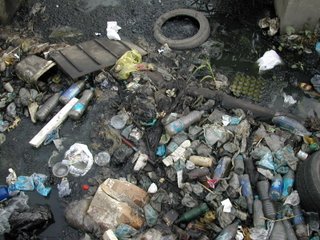On Africa’s longest bridge… with a faulty clutch

Hot and humid, constantly honking horns, the skyline shrouded in red dust, hords of people - in cars, on okadas, hanging out of taxis, by foot - gesticulating, shouting, trying to sell phonecards, mats, mops and bananas while you are stuck in traffic. Everywhere locals calling out oyibo (meaning white person) and hissing to get attention.
Lagos, baby, Lagos! When I was in Abuja people would ask “So where will you be working?” And the others and me would list our various destinations: Kaduna, Delta, Lagos… The invariable response we got was “Ah, Kaduna, beautiful place, you’ll like Kaduna… and you, you will get used to Lagos”. Needless to say this was not the response I was looking for, especially having read Martin Amis’ reference to Lagos as ‘hell on earth’.
And by some definitions he is right. Lagos is rough. It is the prime example of urban decay as well as of what hugely unevenly distributed wealth can do to a city: skyrises crowding with shantytowns, businessmen in chaffour driven Mercedeses rubbing shoulders with Lagosians living on $1 a day. Well, not really rubbing shoulders, in fact, there is a tendency to lock the car when on the bridge, just so that no street beggars or sellers will get the idea to come too close and personal.
So far most of my time in Lagos has been spent in the office or in a car. I live in Ikeja, a part of mainland Lagos, that is quite hectic and industrialized, not upmarket in the same way as Victoria Island or Ikoyi, the two main destinations for big corporations and expats. My housing is actually behind the office, in the same compound, and this has both its benefits and drawbacks. I don’t have a long commute to work, just walk across the lawn actually, and I don’t have to battle the morning rush hour, but then again I do get visits from misguided office care takers at 6-7am in the morning, shouting “Auntie Panni” at the top of their lungs to pick up the keys to the office (even though I have arranged to only give it to the receptionist) or calls from security telling me some useless detail about the generator situation. Unfortunately I am quite convinced that they would be of no help at all in a real emergency as I already seem to know more about how to put on the generator then they do, even though this is the only real task they have apart from opening the gate when a car arrives.
Some of the conversations with support staff are quite surreal, because I don’t understand what they want and they don’t understand my English. No point saying, yes please, etc. If you want something done, shout out the order or simply say “Oga, I beg, put generator on”. They will still probably do the opposite. There are many examples of the good citizens of Nigeria following their intuition rather than doing as requested: I order a coke in a hotel and the waiter comes with Fanta, saying that since I am a girl an orange drink will be more suitable… I ask them to turn off the generator after 12am at night and the light gets switched off inexplicably at 10.30pm in the evening… we are having car trouble on the motorway and the driver gets clear directions to take the car straight to the garage but he still wants to drive it back to the office instead… actually there is a whole story connected to this last event:
On my second day in Lagos, my very nice new boss, Yemisi, arranged with the office driver to take me to Victoria Island to see a bit more of Lagos. When we started our journey back to Ikeja it was already getting dark, and we had just come onto Africa’s longest bridge connecting VI with the mainland, when the clutch just decided to give up. We were in gear four and there was no way of switching gears or slowing down because then the car would just stop.
To make matters worse, it had started to rain and traffic was crazy, all the cars whizzing by, honking aggressively rather than slowing down. I now understand why Nigerians are such fans of praying and blessings – when nothing is working that is your only lifeline. So I reverted to the local habit, and due to lack of other solutions, also prayed: that the traffic lights would be green and for no turns to come up so we could continue our lethal journey in gear four.
But of course there came a turn, and we had to do it in gear four, and the engine sounded like a dying donkey. The vehicle started to spasm on the road, and I reached over to put on the hazards, a feeble attempt to reduce the risk of someone bumping us in our desperate try to get the speed back up.
And the engine died. Stuck on the bridge, in the dark and rain. Of course I had heard the stories of robberies that always happen on the bridge after dark, because armed robbers can easily seal off the expressway with their vans. So again, I prayed. I have to praise the lord though, because Emanuel, the driver, somehow managed to yank the switchgear to one and with great difficulty got the car to start, coughing and spewing but slowly reaching its destination, the garage (after having had to beg him to just do as Yemisi suggested rather than taking matters into his own hand and continue our pained journey across town).
I realized then that Yemisi must be one hell of a woman because she commanded the mechanic to come to his workshop on a Saturday, after hours, and he actually did. This is probably as close to a miracle as I will get in life. Seeing the garage was a sight to behold in itself: a dusty yard with some sheds with scattered bits of exhaust pipes and tires haphazardly thrown around them. There were some kerosene lamps that unsuccessfully attempted to serve as source of light in the pitch dark and I am not even sure how we got back from the workshop in the pouring rain but we made it in one piece in the end.
Tonight I had to go through another trial – walking back from the internet café after darkness had fallen. I had consulted a female colleague about whether it was a good idea or not, moving around in the evening, and she said that in the immediate neighbourhood this should be fine. I guess even though I am unaware of all the faces looking at me curiously, they have memorized the oyibo in the neighbourhood. There is just no way to make yourself invisible. One day I was walking down Allen Avenue and once it got too hot and hassly decided to turn back, only to hear a street vendor asking “Madame, is there a problem, you come back?”. My little stroll did not go unnoticed it seems. The problem is all the machines come very close because the drivers want to take a good look at the whitie and they find it appropriate to honk and shout whilst they are literally sweeping you off the street. The options are either to be hit by a motor or to jump into live sewage. I persevered though and was rewarded by a much quiteter stretch of street once I passed the first security gate leading into my crescent, good old Aba Johnson. In that moment I saw a beautiful thing – a girl whose contour was lit up by a generator powered street lamp, her gracious posture illuminated. Girls have a certain something here, I think it is the way they have to carry those heavy baskets on their heads. You have to be balanced, straight and aware of your movements to pull it off. Perhaps I should start practicing with my waterfilter or something.
I haven’t talked about work yet. It is early days, but it seems that it will be busy and the expectations and nature of the work have nothing Nigerian about them - totally western standard (only the salary is not). The tempo is very hectic and I have already worked late several nights to finish grant proposals and budget that need to be detailed and precise to get potential donors onboard. CFC basically produces documentaries and short films about development issues and works with freelancers to shoot the productions and civil society groups to ensure that the advocacy work continues beyond the airing of an awareness raising programme. They have done work on HIV-AIDS, female circumcision, demeaning widow practices, debt relief for Africa and women entrepreneurs, just to name a few. The executive director is very passionate about development and has an understanding of the issues and really wants to affect change, not just make a glossy production and move on. It is inspiring and I am looking forward to learning more about the area and contribute to something that is all about positive change!
To conclude I have to brag a bit. I have managed to get CFC back online. Our Internet at the office had been down ever since I started and I tried a few tricks to reset the modem and it worked! I am getting my head around all the IT problems in the office since this is after all a developing country and standards are very different. For example one has to deal with the power going off constantly, which not only can cause power surges that damage the hardware, but makes it impossible to work when systems go down. So it is an intricate solution with inverters, USPs and generators having to interact. And then there is the issue of pirated software – it is more customary than not to have ripoffs of MS Office applications and OSs – and ironically computer equipment is much more expensive here than in the West. I just found out that a wireless card is double the price of what you get it for in the US.
To get this epistle posted online I wandered off to the cyber café just to find out that they had run out of diesel for their generator and therefore could not run the computers. On my way back, I did get a proposal, from one of my neighbours to become his partner. I kindly declined. Still, even if you don’t find Internet you can always find a suitor in friendly Nigeria :)



